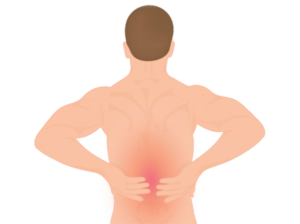According to the National Institutes of Health, around 80 percent of adults experience low back pain at some point. There are many reasons that they can experience the low back pain. Most people only have the low back pain for a short period of time, ranging from days to a few weeks.
When it lasts longer, it is considered chronic low back pain, and it can be a problem that impacts the person’s life in numerous ways. Chronic low back pain is that which lasts for 12 weeks or longer. It’s something that around 20 percent of those who have acute back pain will go on to experience.

Photo courtesy of: https://www.injurymap.com/diagnoses/lower-back-pain
Chronic low back pain is a leading cause of people not being able to work, and it also leaves many people with a fear of movement. Many people who have chronic low back pain are afraid to engage in exercise, work, or particular activities, because they fear that there will be more pain there as a result.
Researchers set out to evaluate the research that has been conducted on this fear that people have and to see what conservative interventions work to reduce it. The results of their study are published in the August 2019 issue of the journal Archives of Physical Medicine and Rehabilitation.
Two researchers reviewed databases, such as PubMed, for all published studies on fear in individuals with chronic low back pain, from the inception through May 2019.
They found 61 studies that fit the evaluation criteria. They then reviewed each study for a range of criteria to gather information regarding what conservative and surgical interventions were reported as being effective.
There were three fear threats that were measured in the studies they analyzed:
- Fear-avoidance beliefs
- Fear of falling
- Kinesiophobia
They found was that fear-avoidance beliefs were reduced by such treatments as manual therapy and electrotherapy, a multidisciplinary intervention helped the fear of falling, and exercise and multidisciplinary interventions helped reduce kinesiophobia. This is important information for those who have chronic low back pain or work in providing a treatment plan for those who do.
Fear needs to be addressed to help people live a better quality of life and be able to engage in many of their normal activities, including working and exercising. Knowing what methods can help reduce the fear can help in providing effective pain management plans.
Postgraduate Education: Pain Medicine
Continue your education with a master’s or certificate program in pain medicine while maintaining your professional practice. Explore the Herman Ostrow School of Dentisty of USC’s online graduate programs in Pain Medicine with the Keck School of Medicine of USC.